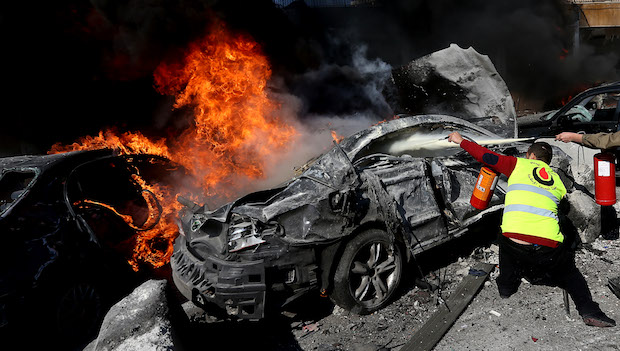
A Hezbollah civil defense worker extinguishes a burned car at the site of an explosion in the Beirut suburb of Beir Hassan, Lebanon, on Wednesday, February 19, 2014.(AP Photo/Hussein Malla)
Beirut and London, Asharq Al-Awsat—Fresh bombings rocked Beirut’s southern suburbs on Wednesday, only a day after signs of improving relations between Hezbollah and the Future Movement appeared.
Security sources told reporters that at least 19 people were killed on Wednesday morning after two vehicle-borne suicide bombs exploded close to an Iranian cultural center in the suburb of Beir Hassan, an area closely associated with Hezbollah.
Dozens more were reportedly injured, including several children at a nearby orphanage, in the latest in a string of attacks on Hezbollah and Iranian targets in and around the city blamed on Sunni jihadist groups.
A Twitter account linked to the Abdullah Azzam Brigades, a Lebanese militant group affiliated with Al-Qaeda, claimed responsibility for the bombings. The same group also said it was behind the bombing of the Iranian embassy in November last year.
Meanwhile, Hezbollah official Wafiq Safa visited Lebanese Justice Minister and Future Movement member Ashraf Rifi on Tuesday. Rifi told Asharq Al-Awsat the meeting was “a prelude to the restoration of political communications” between the two parties.
The two parties are key members of rival political coalitions: Hezbollah in the March 8 alliance, and the Future Movement in the March 14 alliance.
Relations between Hezbollah and the Future Movement have been strained since the March 8 alliance ministers resigned from former Prime Minister Saad Al-Hariri’s government in January 2011, leading to its downfall.
The political estrangement continued until the announcement of the new government on Saturday. Tension between the two parties spiked when Hezbollah objected to the nomination of Rifi for the interior minister post in the new government announced last week during the final hours of negotiations.
Leader of the Progressive Socialist Party Walid Jumblatt, brought the two sides together by contacting the Future Movement’s former parliamentary bloc leader, Fouad Siniora, and leaders of Hezbollah when both sides showed willingness to make a fresh start in their bilateral relations.
Rifi told Asharq Al-Awsat: “The relationship with Hezbollah was disrupted after I retired from my position in the Internal Security Forces during the former government of Najib Mikati, in which the Future Movement refused to participate.”
“Before that, there was a great deal of political and security cooperation with Hezbollah, but this relationship ended during Mikati’s government.”
The meeting between Safa and Rifi was attended by the head of the Information Branch at the Internal Security Forces, Brig. Gen. Imad Othman, and the head of the Operation Room at the Internal Security Forces, Brig. Gen. Hussam Al-Tanoukhi.
